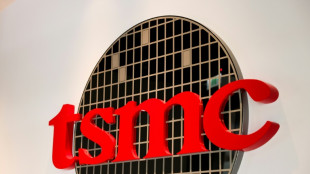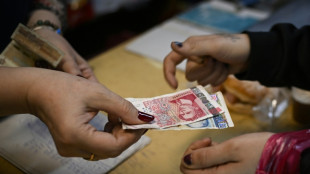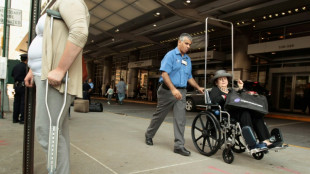US-China at trade impasse as Trump's steel tariff hike strains ties
US President Donald Trump said Wednesday it is "extremely hard" to reach a deal with China as a trade impasse persisted, while his doubling of metal tariffs fueled tensions with key partners.
Trump's latest salvos came as ministers from Organisation for Economic Cooperation and Development (OECD) countries gathered in Paris to discuss the world economy's outlook in light of the trade war.
The US leader's sweeping duties on allies and adversaries have strained ties with trading partners and sparked a flurry of negotiations to avoid the duties.
The White House has suggested Trump will speak to Chinese President Xi Jinping this week, raising hopes they can soothe tensions and speed up a trade deal between the world's two biggest economies.
But early Wednesday, Trump appeared to dampen hopes for a quick resolution.
"I like President XI of China, always have, and always will, but he is VERY TOUGH, AND EXTREMELY HARD TO MAKE A DEAL WITH!!!" he posted on his Truth Social platform.
Asked about the remarks, Chinese foreign ministry spokesman Lin Jian said Beijing's "principles and stance on developing Sino-US relations are consistent."
China was the main target of Trump's April tariff blitz, hit with additional levies of 145 percent on its goods and triggering tit-for-tat tariffs of 125 percent on US imports.
Both sides agreed to temporarily de-escalate in May, while Trump delayed most sweeping measures on other countries until July 9.
- Unjustified and illegal -
Trump's remarks came hours after he increased tariffs on aluminium and steel imports from 25 percent to 50 percent on Wednesday, raising temperatures with various partners while exempting Britain from the higher levy for now.
The move drew sharp rebukes from immediate neighbors Canada and Mexico, with Mexican President Claudia Sheinbaum vowing countermeasures if Trump did not grant tariff relief on exports of the metals.
Canada's Prime Minister Mark Carney blasted the levies as unjustified and illegal, saying they were bad for both American and Canadian industries.
He added that his country would respond, noting that Washington and Ottawa are in "intensive discussions" about their trade relationship.
Tensions could surge further in the coming weeks, with US Commerce Secretary Howard Lutnick opening doors Wednesday to potential tariffs on imported commercial aircraft and parts.
Lutnick said Washington is expecting an investigation update on such imports and will soon "set the standard for aircraft part tariffs."
Mexico will request an exemption from the higher metals tariff, Economy Minister Marcelo Ebrard said, arguing it was unfair as the United States exports more steel to its southern neighbour than it imports.
While some of Trump's most sweeping levies face legal challenges, they have been allowed to remain in place for now as an appeals process takes place.
- US-EU talks 'advancing' -
But the United States and European Union struck a more conciliatory note after talks on the sidelines of the OECD gathering in Paris.
US Trade Representative Jamieson Greer said after talks with EU counterpart Maros Sefcovic that negotiations were "advancing quickly."
Greer added that the meeting was "very constructive and indicates a willingness by the EU to work with us to find a concrete way forward to achieve reciprocal trade."
EU goods will be hit with 50-percent tariffs on July 9 unless the 27-nation bloc reaches a deal with Washington. The EU has vowed to retaliate.
Sefcovic said the doubling of metal tariffs "doesn't help the negotiations" but the two sides were nonetheless "making progress."
The US-EU meeting took place a day after the OECD cut its forecast for global economic growth, blaming Trump's tariffs for the downgrade.
A report by the nonpartisan Congressional Budget Office in Washington found Wednesday that Trump's tariffs would reduce the size of the US economy and fuel inflation, while lowering federal deficits.
After talks Tuesday between UK Trade Secretary Jonathan Reynolds and Greer, London said metals imports from Britain would remain at 25 percent for now. Both sides need to work out duties and quotas in line with the terms of a recently signed trade pact.
burs-bys/mlm
P.Palacios--ECdLR






